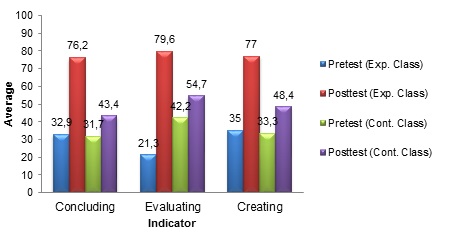
The Use of Inquiry-Based Handouts on Science Learning for Student Critical Thinking Ability
Abstract
Keywords
Full Text:
PDFReferences
Abdullah., Rasmiwetti., & Ardiansyah. (2019). Profile of Superior High School Students’ Higher Order Thinking Skills on Stoichiometry Topic. Journal of Educational Sciences. 3(2), 174-183.
Ahmad, A. (2007). Memahami berfikir kritis. (Online) http://jurnal.pendidikan.net/PendidikanNetwork/.
Andrews, R. (2015). Critical thinking and/or argumentation in higher education, In M. Davies, & R. Barnett (Eds.). The palgrave handbook of critical thinking in higher education, 49–62.
Changwong, K., Sukkamart, A., & Sisan, B. (2018). Critical thinking skill development: analysis of a new learning management model for Thai high schools. Journal of International Studies, 11(2), 37-48.
Ennis, R. H. (2011). The nature of critical thinking: an outline of critical thinking dispositions and abilities. University of Illinois. (Online) http://faculty.education.illinois.edu/rhennis/documents/TheNatureofCriticalThinking_51711_000.pdf.
Erwiza, Sri Kartiko, Gimin. (2019). Factor affecting the concentration of learning and critical thinking on student learning achievement in economic subject. Journal of Eduicational Science, 3(2), 205-215
Karacoc, M. (2016). The significance of critical thinking ability in terms of education. International Journal of Humanities and Social Science, 6 (7), 81-84.
Kasdin, F. (2012). Critical thinking: membangun pemikiran yang logis. Jakarta: Sinar Harapan.
Kumar, R., & James, R. (2015). Evaluation of critical thinking in higher education in Oman. International Journal of Higher Education, 4(3), 33-43.
Kusuma, E, D., Gunarhadi., & Riyadi. (2018). The strategies to improve critical thinking skills through problem based quantum learning model at primary school. International Journal of Multicultural and Multireligious Understanding, 5(4), 123-127.
Lorin, A.W & David, K.R. (2010). A taxonomy for learning, teaching and assesing a revision of bloom’s taxonomy of educational objectives. USA: Addison Wesley Longman.
Mutawski, L. M. (2014). Critical thinking in the classroom and beyond, Journal of Learning in Higher Education, 10(1), 25-30.
Santoso, H. (2010). Memberdayakan kemampuan berfikir kritis siswa melalui pembelajaran kontruktivitik. Jurnal Bioedukasi. 1(1), 1-7.
Sarjono. (2017). Internalisasi berfikir kritis dalam pembelajaran fisika, Jurnal Madaniyah, 7(2), 343-352.
Styron, R. A. (2014). Critical thinking and collaboration: a strategy to enhance student learning, Systemic, Cybernetics and Informations, 12(7), hal. 25-30.
Sugiyono. (2010). Metode penelitian pendidikan. Bandung: Alfabeta.
Surya, H. (2013). Cara belajar orang genius. Jakarta: Elex Media Komputindo.
Zainul, A., & Nasution, N. (2010). Penilaian hasil belajar. PAU-PPAI Universitas Terbuka, Jakarta.
Zulirfan., Rahmad, M., Yennita., Nina Kurnia., & Muhammad Sofyan Hadi. (2018). Science Process Skills and Attitudes toward Science of Lower Secondary Students of Merbau Island: A Preliminary Study on the Development of MaritimeBased Contextual Science Learning Media. Journal of Educational Sciences. 2(2). Hal 90-99.
DOI: http://dx.doi.org/10.31258/jes.3.3.p.353-363
Refbacks
- There are currently no refbacks.
Copyright (c) 2019 Suparmi Suparmi, Yustina Yustina, Wan Syafii

This work is licensed under a Creative Commons Attribution 4.0 International License.
Publisher: FKIP Universitas Riau













